Many stars at Women’s World Cup juggle parenthood while playing on the world stage
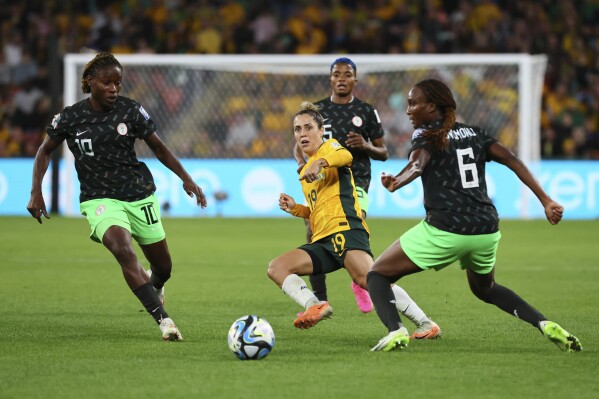
Australia’s Katrina Gorry, center, plays the ball next to Nigeria’s Ifeoma Onumonu, right, and Christy Ucheibe, left, during the Women’s World Cup Group B soccer match between Australia and Nigeria In Brisbane, Australia, Thursday, July 27, 2023. Nigeria won 3-2. (AP Photo/Tertius Pickard)
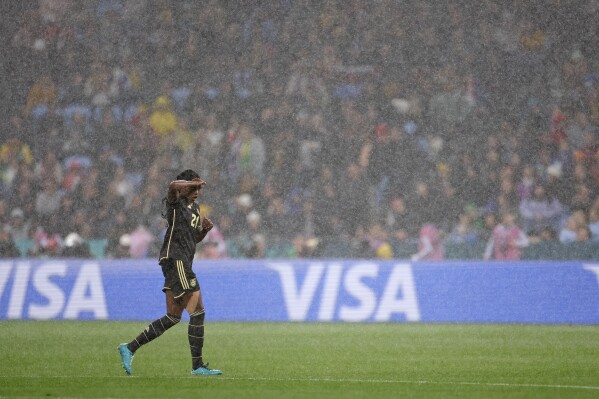
Jamaica’s Cheyna Matthews shields her eyes as rain intensifies during the Women’s World Cup Group F soccer match between France and Jamaica at Sydney Football Stadium in Sydney, Australia, Sunday, July 23, 2023. (AP Photo/Sophie Ralph)
BY ANNE M. PETERSON
August 3, 2023
Alex Morgan was speaking to reporters at the Women’s World Cup when she had to excuse herself to Facetime her young daughter before the toddler’s bedtime back home in the United States.
Just another day for a working mom.
Forget about orange slices, players such as Morgan, Katrina Gorry of Australia and Cheyna Matthews of Jamaica are redefining what it means to be a “soccer mom.”
There have been plenty of elite athletes who have also juggled parenthood, but the level of support the mothers are receiving while on the job at the Women’s World Cup is improving.
MORE WOMEN’S WORLD CUP COVERAGE
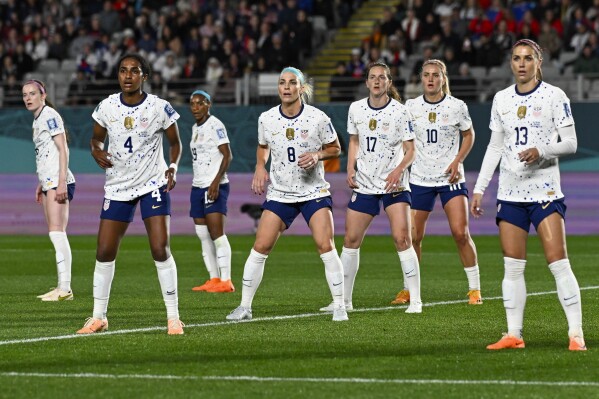
U.S. Women’s World Cup tie with Portugal draws overnight audience of 1.35 million on Fox
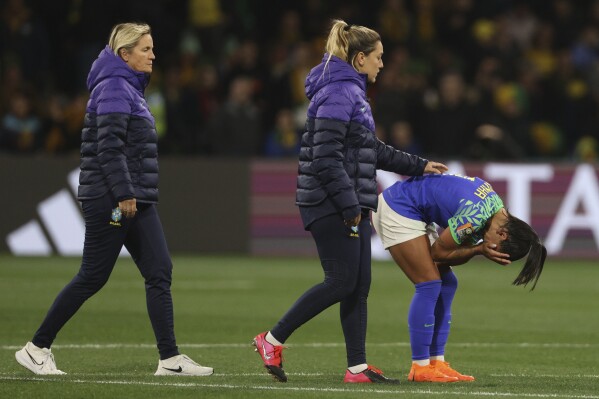
Expanded Women’s World Cup leads to earlier drama for highly-ranked teams
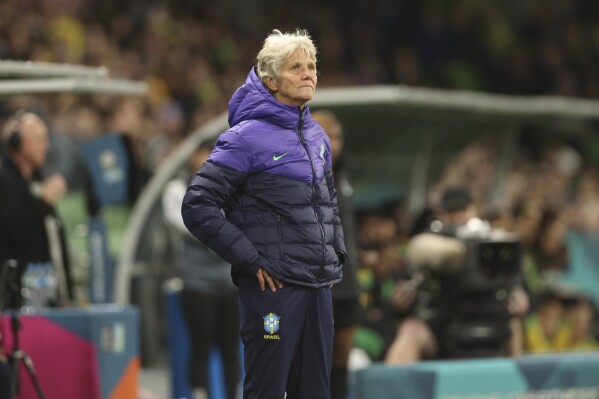
Brazil coach Sundhage criticized over the team’s lack of flair after Women’s World Cup exit
Morgan’s daughter, Charlie, has now joined her mother at the World Cup as the United States prepares for a Round of 16 match against Sweden on Sunday in Melbourne, Australia.
Morgan has been reflective about being both a parent and a player at soccer’s biggest international tournament. In 2019, when the United States won its second straight World Cup trophy and fourth overall, now 3-year-old Charlie hadn’t even been born.
Now that the American star has a daughter, she’s had to balance her job with trying to lead the United States to an unprecedented third consecutive World Cup title.
“I have become a little bit more patient with my daughter and in life in general. But I think the biggest thing about it is that I get to bring my daughter with me. On all of these trips, I get to show her what mom does and surround her by just so many strong and confident women,” Morgan said.
There are three moms on the U.S. team: Morgan, Crystal Dunn and Julie Ertz. Other moms at this World Cup include Konya Plummer of Jamaica, Amel Majri of France, Vanina Correa of Argentina and Melanie Leuopolz of Germany.
Morgan, Ertz and Dunn have all become mothers since winning the World Cup in 2019, and all three are benefitting from the battles that prior players fought to make sure that moms — and their kids — were supported while representing the United States abroad.
The U.S. women have enjoyed subsidized child care at tournaments for 25 years, but now, thanks to collective bargaining agreements that were struck last year with U.S. Soccer, the men have it, too. Those agreements guaranteed that both national teams were paid equally and received similar benefits.
“It was important to us and to the women that everything was equal, and we were very transparent about that,” said goalkeeper Matt Turner, who brought his wife and son to the men’s World Cup in Qatar late last year. “We’re going to take advantage of the different benefits that the other team might have had.”
Majri is the mother of a 1-year old daughter, Maryam, who accompanied her to a training camp in April. Her daughter’s presence was supported by French coach Herve Renard.
“There needs to be organized facilities, with a nanny. It won’t affect the team, and psychologically speaking, it’s very important. In order for her to have peace of mind and to perform well, the two need to be associated,” Renard said. “There is progress to be made in terms of assistance. We’re going to manage what they do in the USA. Maybe one day we’ll end up with four or five kids among us, and if things run smoothly, it won’t be an issue.”
In 2020, FIFA adopted rules to protect women who choose to become parents, including mandatory maternity leave of at least 14 weeks, and continued pay at a minimum of two-thirds of their salary. The rules also require clubs to make sure women are reintegrated after childbirth and that they have necessary medical support.
“No female player should ever suffer a disadvantage as a result of becoming pregnant, thus securing greater employment protection for women in football,” FIFA said in announcing the new rules.
While all of the Americans have their kids with them at the World Cup, others choose to leave them at home.
“Being a mom and leaving them at home is hard, but it is obviously a personal decision to be here. They are enjoying it from home, they didn’t ask to come,” said Correa, Argentina’s goalkeeper, and the mother of twins. “They have told me they are proud that I’m here. I know they are with me and it gives me the energy and drive to be here.”
Moms at the World Cup are helping show that parenting and soccer can mix, but some are slow to catch on. A television commentator came under fire for his comments about Gorry, who had IVF treatments and gave birth to her daughter, Harper, in 2021.
“Certainly motherhood has not blunted her competitive instincts, that’s for sure,” the Australian broadcaster said during the Matlidas’ tournament-opener against Ireland.
Ertz gave birth to son, Madden, last year and worked hard to get back in time for the World Cup. It was tough for Ertz because she had not played for the team since the 2021 Olympics because of injuries and her pregnancy.
“I think the truth is, I had no idea what my timeline was going to be where typically, like, obviously, pregnancy changes for your body changes it for so long versus like an injury, which usually has a timeline,” she said.
Madden has a village caring for him at the World Cup, including his dad, Arizona Cardinals tight end Zach Ertz — and of course all his `aunts’ on the U.S. team.
“Like anything else in life, you figure it out, and we’re doing it together as a family,” Julie Ertz said. “It’s just a really cool opportunity to be able to share with them.”
___
AP World Cup coverage: https://apnews.com/hub/fifa-womens-world-cup
Australia’s Katrina Gorry, center, plays the ball next to Nigeria’s Ifeoma Onumonu, right, and Christy Ucheibe, left, during the Women’s World Cup Group B soccer match between Australia and Nigeria In Brisbane, Australia, Thursday, July 27, 2023. Nigeria won 3-2. (AP Photo/Tertius Pickard)
Jamaica’s Cheyna Matthews shields her eyes as rain intensifies during the Women’s World Cup Group F soccer match between France and Jamaica at Sydney Football Stadium in Sydney, Australia, Sunday, July 23, 2023. (AP Photo/Sophie Ralph)
BY ANNE M. PETERSON
August 3, 2023
Alex Morgan was speaking to reporters at the Women’s World Cup when she had to excuse herself to Facetime her young daughter before the toddler’s bedtime back home in the United States.
Just another day for a working mom.
Forget about orange slices, players such as Morgan, Katrina Gorry of Australia and Cheyna Matthews of Jamaica are redefining what it means to be a “soccer mom.”
There have been plenty of elite athletes who have also juggled parenthood, but the level of support the mothers are receiving while on the job at the Women’s World Cup is improving.
MORE WOMEN’S WORLD CUP COVERAGE
U.S. Women’s World Cup tie with Portugal draws overnight audience of 1.35 million on Fox
Expanded Women’s World Cup leads to earlier drama for highly-ranked teams
Brazil coach Sundhage criticized over the team’s lack of flair after Women’s World Cup exit
Morgan’s daughter, Charlie, has now joined her mother at the World Cup as the United States prepares for a Round of 16 match against Sweden on Sunday in Melbourne, Australia.
Morgan has been reflective about being both a parent and a player at soccer’s biggest international tournament. In 2019, when the United States won its second straight World Cup trophy and fourth overall, now 3-year-old Charlie hadn’t even been born.
Now that the American star has a daughter, she’s had to balance her job with trying to lead the United States to an unprecedented third consecutive World Cup title.
“I have become a little bit more patient with my daughter and in life in general. But I think the biggest thing about it is that I get to bring my daughter with me. On all of these trips, I get to show her what mom does and surround her by just so many strong and confident women,” Morgan said.
There are three moms on the U.S. team: Morgan, Crystal Dunn and Julie Ertz. Other moms at this World Cup include Konya Plummer of Jamaica, Amel Majri of France, Vanina Correa of Argentina and Melanie Leuopolz of Germany.
Morgan, Ertz and Dunn have all become mothers since winning the World Cup in 2019, and all three are benefitting from the battles that prior players fought to make sure that moms — and their kids — were supported while representing the United States abroad.
The U.S. women have enjoyed subsidized child care at tournaments for 25 years, but now, thanks to collective bargaining agreements that were struck last year with U.S. Soccer, the men have it, too. Those agreements guaranteed that both national teams were paid equally and received similar benefits.
“It was important to us and to the women that everything was equal, and we were very transparent about that,” said goalkeeper Matt Turner, who brought his wife and son to the men’s World Cup in Qatar late last year. “We’re going to take advantage of the different benefits that the other team might have had.”
Majri is the mother of a 1-year old daughter, Maryam, who accompanied her to a training camp in April. Her daughter’s presence was supported by French coach Herve Renard.
“There needs to be organized facilities, with a nanny. It won’t affect the team, and psychologically speaking, it’s very important. In order for her to have peace of mind and to perform well, the two need to be associated,” Renard said. “There is progress to be made in terms of assistance. We’re going to manage what they do in the USA. Maybe one day we’ll end up with four or five kids among us, and if things run smoothly, it won’t be an issue.”
In 2020, FIFA adopted rules to protect women who choose to become parents, including mandatory maternity leave of at least 14 weeks, and continued pay at a minimum of two-thirds of their salary. The rules also require clubs to make sure women are reintegrated after childbirth and that they have necessary medical support.
“No female player should ever suffer a disadvantage as a result of becoming pregnant, thus securing greater employment protection for women in football,” FIFA said in announcing the new rules.
While all of the Americans have their kids with them at the World Cup, others choose to leave them at home.
“Being a mom and leaving them at home is hard, but it is obviously a personal decision to be here. They are enjoying it from home, they didn’t ask to come,” said Correa, Argentina’s goalkeeper, and the mother of twins. “They have told me they are proud that I’m here. I know they are with me and it gives me the energy and drive to be here.”
Moms at the World Cup are helping show that parenting and soccer can mix, but some are slow to catch on. A television commentator came under fire for his comments about Gorry, who had IVF treatments and gave birth to her daughter, Harper, in 2021.
“Certainly motherhood has not blunted her competitive instincts, that’s for sure,” the Australian broadcaster said during the Matlidas’ tournament-opener against Ireland.
Ertz gave birth to son, Madden, last year and worked hard to get back in time for the World Cup. It was tough for Ertz because she had not played for the team since the 2021 Olympics because of injuries and her pregnancy.
“I think the truth is, I had no idea what my timeline was going to be where typically, like, obviously, pregnancy changes for your body changes it for so long versus like an injury, which usually has a timeline,” she said.
Madden has a village caring for him at the World Cup, including his dad, Arizona Cardinals tight end Zach Ertz — and of course all his `aunts’ on the U.S. team.
“Like anything else in life, you figure it out, and we’re doing it together as a family,” Julie Ertz said. “It’s just a really cool opportunity to be able to share with them.”
___
AP World Cup coverage: https://apnews.com/hub/fifa-womens-world-cup
When Clarisse Agbégnénou won her sixth world judo title, confirming the reigning Olympic champion as one of the athletes to watch at next year’s Paris Games, the French star’s smallest but greatest fan was less wild about her mother’s newest gold medal than she was about her breast milk.
BY JOHN LEICESTER
August 4, 2023
PARIS (AP) — When Clarisse Agbégnénou won her sixth world judo title, confirming the reigning Olympic champion as one of the athletes to watch at next year’s Paris Games, the French star’s smallest but greatest fan was less wild about her mother’s newest gold medal than she was about her breast milk.
After a peckish day of few feeds — because mum had been busy putting opponents through the wringer — 10-month-old Athéna made amends that night.
“She didn’t let my boobs out of her mouth,” Agbégnénou says. “I was like, ‘Wow, okay.’ I think it was really something for her.”
French judoka Clarisse Agbegnenou gestures during an interview with The Associated-Press in Paris, Wednesday, June 14, 2023. Breast-feeding and high-performance sports were long an almost impossible combination for women athletes, faced for decades with the cornelian choice of career or motherhood, because it was so tough to have both. But that’s becoming less true ahead of the first Summer Games where men and women will compete in equal numbers and with pioneering super-mums showing that it’s possible (AP Photo/Michel Euler)
Breastfeeding and high-performance sports were long an almost impossible combination for top female athletes, torn for decades between careers or motherhood, because having both was so tough.
But that’s becoming less true ahead of the 2024 Olympics, where women will take another step forward in their long march for equality, competing in equal numbers with men for the first time, and with pioneering mothers like Agbégnénou showing that it is possible to breastfeed and be competitive.
They don’t pretend that late-night feeds, broken sleep, pumping milk and having to eat for two people are easy. But some female athletes are also discovering that juggling their careers with the rigors of motherhood can pay off with powerful emotional well-being.
Speaking in an interview with The Associated Press, Agbégnénou said she stunned even herself by coming back so quickly from childbirth to win at the worlds in May, with Athéna in tow and expecting to be fed every few hours.
French judoka Clarisse Agbegnenou breast-feeds her baby Athena at an unknown location in France, Oct. 17, 2022. Breast-feeding and high-performance sports were long an almost impossible combination for women athletes, faced for decades with the cornelian choice of career or motherhood, because it was so tough to have both. But that’s becoming less true ahead of the first Summer Games where men and women will compete in equal numbers and with pioneering super-mums showing that it’s possible (Nadia Benabdelouamed via AP)
In training, Agbégnénou would stop for quick feeds when Athéna needed milk, nestling her hungry baby in the folds of her kimono, while other athletes in the judo hall paid them no mind, carrying on with their bouts.
“I was sweating on her, poor baby,” she says. “But she didn’t pay attention. She just wanted to eat.”
Women who have breastfed and carried on competing say that support from coaches and sports administrators is essential. Agbégnénou credits the International Judo Federation for allowing her to take Athéna to competitions. IJF officials sounded out other competitors and coaches about whether the baby was a nuisance for them and were told, “‘No, she was really perfect, we didn’t hear the baby,’” she says.
“It’s amazing,” she says of her peers’ acceptance and support. “They are part of my fight and I am really proud of them.”
As well as Agbégnénou, three other women also asked and were allowed to nurse their babies at IJF World Tour competitions in the past six years, with arrangements made each time that enabled the moms “to care for the child and to not disturb other athletes’ preparation,” says the governing body’s secretary general, Lisa Allan. She says the IJF is now drawing up specific policies for judokas who are pregnant or postpartum because ”more and more athletes are continuing their careers whilst balancing having a family.”
The Paris Olympics’ chief organizer, Tony Estanguet, says they’re also exploring the possibility of providing facilities for nursing athletes at the Games.
“They should have access to their children — for the well-being of the mothers and the children,” he said in an AP interview. “The status of athletes who are young mothers needs to evolve a bit. We need to find solutions to perhaps make it easier for these athletes to bring babies” into the Olympic village where athletes are housed.
For some breastfeeding athletes, being a pioneer is part of the kick.
French judoka Clarisse Agbegnenou gestures during an interview with The Associated-Press in Paris, Wednesday, June 14, 2023. Breast-feeding and high-performance sports were long an almost impossible combination for women athletes, faced for decades with the cornelian choice of career or motherhood, because it was so tough to have both. But that’s becoming less true ahead of the first Summer Games where men and women will compete in equal numbers and with pioneering super-mums showing that it’s possible (AP Photo/Michel Euler
Two-time Olympic rowing champion Helen Glover, now aiming for her fourth Summer Games, gave birth to twins at the start of the COVID-19 outbreak, breastfed them and then came out of what she’d intended to be retirement to compete at the pandemic-delayed Tokyo Games in 2021. Glover was the first rower to compete for Britain at the Olympics as a mother.
Glover’s eldest, Logan, lost interest in her milk about the time of his first birthday, but twins Kit and Willow kept feeding to 14 months old. She says that mixing her punishing rowing training with long feeds for two babies was “very draining. It was taking every calorie I had.”
“But I could do it because it was my own time and my own choice,” she says.
“Everyone should have the choice,” Glover adds. “Our bodies ... are sometimes very changed through childbirth and pregnancy and breastfeeding. So the answers are never going to be one-size-fits-all. But I think it’s really exciting that these conversations are even being had.”
For some athletes, Milk Stork has also been a help. The U.S.-based transporter ships working moms’ milk when they’re separated from their babies. It says it shipped milk pumped by athletes who competed at the 2021 Paralympic Games in Tokyo and also transported 21 gallons (80 liters) of milk from coaches, trainers and other support staff at the Olympics that year.
The daughter of British archery athlete Naomi Folkard was just 5 1/2-months old and breastfeeding exclusively when her mother traveled to Tokyo for her fifth and final Olympic Games.
Nursing mothers successfully pushed to be able to take babies to those Olympics, held with social distancing and without full crowds because of the coronavirus pandemic. Rather than put her daughter, Emily, through the ordeal of having to live apart from her, in a Tokyo hotel outside of the athletes’ village, Folkard reluctantly left her behind with a large stock of frozen milk. She built that up over months, pumping into the night so Emily wouldn’t go hungry while she was in Japan.
But that created another problem: Because Folkard’s breasts had become so good at making milk, she had to pump regularly at the Games to stop them from becoming painfully swollen. She threw that milk away.
“I was having to get up in the night and pump just because my supply was so much,” she says. “It wasn’t great for performance preparation really. But I did what I had to do to be there.”
And with each drop, progress.
“There’s still a long way to go, but people are talking about it now. Women aren’t retiring to have children. They’re still competing,” Folkard says.
“I feel like things are changing.”
__
More AP coverage of the Paris Olympics: https://apnews.com/hub/2024-paris-olympic-games and https://twitter.com/AP_Sports
No comments:
Post a Comment